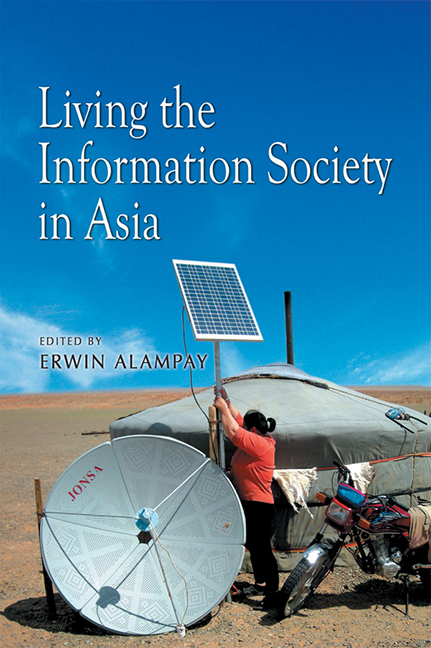Book contents
- Frontmatter
- Contents
- Foreword
- Preface
- List of Abbreviations
- Contributors
- Introduction: Perspectives of ICT Research in Asia
- 1 What Would Durkheim Have Thought? Living in (and with) the Information Society
- 2 What Is a Mobile Phone Relationship?
- 3 Technologies of Transformation: The End of the Social or the Birth of the Cyber Network?
- 4 Becoming Mobile in Contemporary Urban China: How Increasing ICT Usage Is Reformulating the Spatial Dimension of Sociability
- 5 Mobile Religiosity in Indonesia: Mobilized Islam, Islamized Mobility and the Potential of Islamic Techno Nationalism
- 6 Moral Panics and Mobile Phones: The Cultural Politics of New Media Modernity in India
- 7 Stories from e-Bario
- 8 Life and Death in the Chinese Informational City: The Challenges of Working-Class ICTs and the Information Have-less
- 9 Institutional Responses to GIS Adoption for RPTA in Local Governments
- 10 Customer Acquisition among Small and Informal Businesses in Urban India: Comparing Face-to-Face and Mediated Channels
- 11 The View from the Other Side: The Impact of Business Process Outsourcing on the Well-being and Identity of Filipino Call Centre Workers
- 12 Empowering Thai Homeworkers through ICTs
- Index
Introduction: Perspectives of ICT Research in Asia
Published online by Cambridge University Press: 21 October 2015
- Frontmatter
- Contents
- Foreword
- Preface
- List of Abbreviations
- Contributors
- Introduction: Perspectives of ICT Research in Asia
- 1 What Would Durkheim Have Thought? Living in (and with) the Information Society
- 2 What Is a Mobile Phone Relationship?
- 3 Technologies of Transformation: The End of the Social or the Birth of the Cyber Network?
- 4 Becoming Mobile in Contemporary Urban China: How Increasing ICT Usage Is Reformulating the Spatial Dimension of Sociability
- 5 Mobile Religiosity in Indonesia: Mobilized Islam, Islamized Mobility and the Potential of Islamic Techno Nationalism
- 6 Moral Panics and Mobile Phones: The Cultural Politics of New Media Modernity in India
- 7 Stories from e-Bario
- 8 Life and Death in the Chinese Informational City: The Challenges of Working-Class ICTs and the Information Have-less
- 9 Institutional Responses to GIS Adoption for RPTA in Local Governments
- 10 Customer Acquisition among Small and Informal Businesses in Urban India: Comparing Face-to-Face and Mediated Channels
- 11 The View from the Other Side: The Impact of Business Process Outsourcing on the Well-being and Identity of Filipino Call Centre Workers
- 12 Empowering Thai Homeworkers through ICTs
- Index
Summary
For it is inescapable that every culture must negotiate with technology, whether it does so intelligently or not. A bargain is struck in which technology giveth and technology taketh away. (Postman 1992, p. 5)
The quote from Postman's Technopoly captures the ambivalence and many of the contradictions that people experience with technology. It is as true today, with information and communication technologies (ICTs), as it was during the industrial revolution with the steam engine and industrial factories. Technology affects us at various levels, and for both good and ill.
As one of the key transformative factors in a globalizing world, the advances in ICTs have transformed everyday life and how people interact and interconnect with each other, communities, states, and markets. The so-called “ICT-revolution”, as noted and debated by scholars, politicians, and policy-makers, has had an inordinate effect on economies and societies, leading to what has been termed a “global shift” (Cerny 1995). This suggests two fundamental alterations to the global political economy. First, there is the movement from an industrially-based international economy to one that is information- and knowledge-based. For some, these changes signal the emergence of the “Third Industrial Revolution” which is both transnational in character and based on post-Fordist regimes of accumulation. Second, the ICT revolution is said to have profound positive and negative social, political and economic consequences that can become factors in determining development and underdevelopment. As such, ICT and its management have become a new rhetoric of development.
It is against this backdrop that the compendium of papers in this book examines how people's lives in Asia are being affected by ICTs and the new ways of communicating (i.e. via Internet, mobile phones, cameras, blogs, short messaging system, call centres) that come with it.
A CALL TO ACTION FOR ICT RESEARCH
Rich Ling (Chapter 1) opens this collection of papers with an examination of the parallels between the sociological efforts to understand the changes that had occured during the industrial period, and current endeavours to study the effects of new ICTs. Asian societies are experiencing the transition from a dearth of ICTs to universal access; hence, Ling argues that it is an opportune time for researchers to examine their impact. Whether it is technology that is shaping contemporary society, or whether it is society which dictates how technology is used is irrelevant.
- Type
- Chapter
- Information
- Living the Information Society in Asia , pp. xvii - xxivPublisher: ISEAS–Yusof Ishak InstitutePrint publication year: 2009

